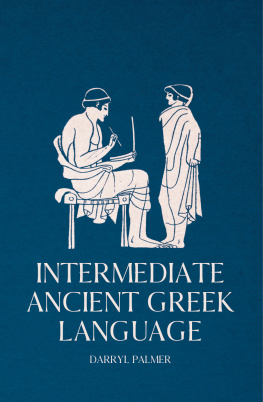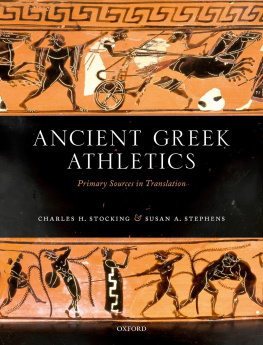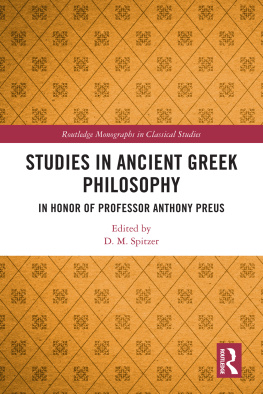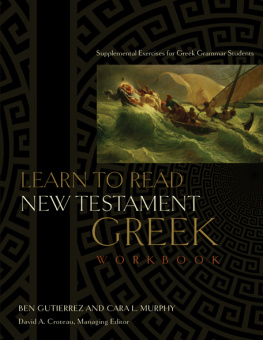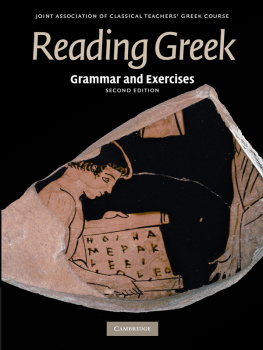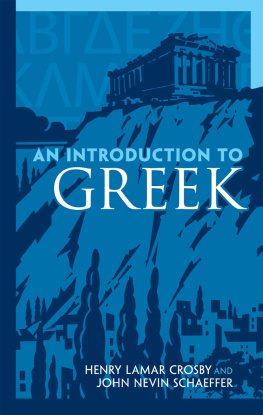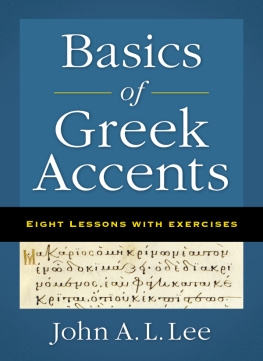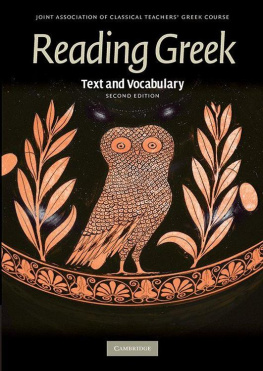Intermediate Ancient Greek Language Intermediate Ancient Greek Language Darryl Palmer
Published by ANU Press The Australian National University Acton ACT 2601, Australia Email: anupress@anu.edu.au Available to download for free at press.anu.edu.au ISBN (print): 9781760463427 ISBN (online): 9781760463434 WorldCat (print): 1241230170 WorldCat (online): 1241230169 DOI: 10.22459/IAGL.2021 This title is published under a Creative Commons Attribution-NonCommercial- NoDerivatives 4.0 International (CC BY-NC-ND 4.0). The full licence terms are available at creativecommons.org/licenses/by-nc-nd/4.0/legalcode Cover design and layout by ANU Press This edition 2021 ANU Press
Contents xiii Abbreviations and Symbols abs. absolute Acc. Accusative Act. Active adj. adverb Aor. adverb Aor.
Aorist (B)CE (Before) the Common Era Dat. Dative fem. feminine Fut. Future Gen. Genitive Hist. Historic Imperf.
Imperfect Impv. Imperative Indic. Indicative Infin. Infinitive Intr. Intransitive lit. masculine Mid. masculine Mid.
Middle neut. neuter Nom. Nominative Opt. Optative Partc. Participle Pass. Passive Perf.
Perfect pers. person pl. plural Pres. Present sg. singular Subj. Subjunctive Voc.
Vocative Angular brackets enclose words supplied in translation: <>. Square brackets enclose either brief explanatory notes or words not needing to be translated in Exercises: []. Introduction This series of Lessons and Exercises is intended for students who have already covered all or most of an introductory course in the ancient Greek language. It aims to broaden and deepen students understanding of the main grammatical constructions of Greek. Further attention is given to grammatical forms only to the extent necessary to illustrate their functions. With one exception, all Greek passages in the Lessons and Exercises (including English to Greek translation) are direct quotations from Greek authors.
Some quotations are modified by the omission of a few words (marked by ellipses) for the sake of brevity, but without affecting the grammatical structure. In Lesson on Conditions, brief model sentences have been employed to demonstrate more clearly the variety of conditional sentences. In the Lessons, all Greek passages are translated into literal but reasonably idiomatic English. For the most part, passages in both the Lessons and the Exercises are drawn from main genres of the classical period (fifth to fourth centuries BCE)tragedy, comedy, historiography (together with biography), oratory and philosophy. Non-dramatic lyric is not often used, since it is more difficult to understand a single sentence out of context in this genre. Didactic poetry (Hesiod) also appears seldom.
Homer receives attention at particular points, mainly Homeric conditions (Lesson 20) and Homeric similes (Lesson on clauses of comparison). In general, the focus is on the classical Attic dialect. Where Epic or Ionic forms occur, they are explained if necessary. Occasionally there are references forward to the Hellenistic period. The first few Lessons have an emphasis on Time and Aspect in the Greek verbal system. After the Moods of the finite verb in Lessons and 2, Infinitives and Participles are treated in Lessons and The absolute constructions of the Participles in the Genitive and Accusative Cases follow in Lessons and The verbal adjectives ending in - , - , - are treated in Lesson 7, and those ending in - , - , - in Lesson 8.
Lesson is primarily concerned with the use of the Middle Voice in the classical period. Lesson deals with commands and Lesson 11 with wishes. These two Lessons expand the concise treatment of Imperative, Intermediate Ancient Greek Language Subjunctive and Optative Moods in Main clauses in Lesson In addition to the most basic constructions, Lessons and present the variety of ways in which commands and wishes may be expressed. These two Lessons also cover the subordinate constructions for reported commands and reported wishes. Lesson provides a brief and basic presentation of directly quoted statements. This leads on to the range of subordinate constructions, which begins with reported statements in Lessons and 14, and extends to Lesson This sequence is interrupted at two points.
Lesson on questions is followed by Lesson on reported questions. Lesson on subordinate clauses in reported discourse is placed intentionally in the midst of the sequence of subordinate constructions. Discussion of the Cases has been deliberately placed late in the series at Lessons to By this stage, students will be better prepared to analyse the Case usage with which they are now familiar. For the classical period, the consideration of prepositions in Lesson naturally follows the treatment of the Cases. Lesson on correlative clauses has numerous links with adjectival and adverbial constructions in previous Lessons. Finally, Lesson deals with exclamations.
The majority of the Exercises comprise several passages for translation from Greek to English and one or more passages (depending on length) for translation from English to Greek. It is intended that students should use the full and most recent edition of A GreekEnglish Lexicon originally compiled by H. G. Liddell and R. Scott. Alternatively, The Brill Dictionary of Ancient Greek , originally compiled by F.
Montanari for Italian readers, is now available with American-English spellings (see Bibliography for both dictionaries). However, to save time for students, some vocabulary is provided for specific passages in each of the Exercises. Exercises to and Exercises to involve translation from Greek to English only, but do require brief analytical comment. Exercise on Homeric conditions involves translation from Greek to English only, but requires no further comment. Alternative Exercises (A and B) are provided for Lessons 34, and Exercises are of approximately equal length. INTRODUCTION Accent marks indicate how a pitch accent was probably pronounced in Classical Greek.
No separate Exercises are provided for this purpose. But the books of Allen (1987) and Probert (2003) are recommended. The table near the end of Lesson and the accompanying list of Tenses largely correspond to those of the Joint Committee on Grammatical Terminology (1911) as modified by Masterman (1962). Masterman (1962, p .72) began his article with the following words: It is over fifty years now since the formation of the Joint Committee on Grammatical Terminology, and the presentation of its Report ; and it seems to be high time that teachers of languages considered, first, how successful they have been in carrying out its recommendations, and secondly, what modifications are called for in the light of more recent knowledge. Since Mastermans article was published, over more years have passed, and it seems high time that a new intermediate Greek language textbook be made available. The grammars of Ancient Greek by Goodwin (1889) and Smyth (1956) remain the most convenient in English, despite their age.
Next page
